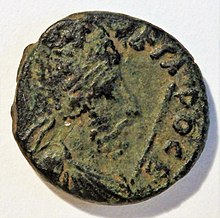Abgar VIII.
Abgar VIII. ( Lucius Aelius Septimius Abgar VIII., The Great ; † 212 ) was king of Osrhoene with the capital Edessa, today's Şanlıurfa , from about 177 until his death .
Life
Abgar VIII was a son of Manu VIII and from about 177 king of Edessa. In 191/192 he took the name Lucius Aelius in honor of the Roman Emperor Commodus . After Commodus' murder he supported the counter-emperor Pescennius Niger . In 194 he was defeated by the emperor Septimius Severus , then submitted to this in the following year, took on the further name of Septimius in his honor and handed his sons hostage. From now on he stood loyally at the side of the Roman emperor and therefore did not support the Parthians . Septimius Severus recognized him for this in 198 as a client king and "King of kings". Abgar had coins minted with the portrait of Septimius Severus on one side and his portrait on the other. According to the Chronicle of Edessa, Abgar's palace fell victim to a flood in 201. Later Abgar VIII is said to have paid a visit to the city of Rome . His son Abgar IX. followed him to the throne.
The Syrian Christian Gnostic Bardesanes was one of the childhood friends of Abgar VIII . It is possible that Abgar VIII converted to Christianity , but the church father Eusebius of Caesarea reports nothing in his church history of Abgar's conversion. Bardesanes, on the other hand, tells in his book of the laws of the countries that Abgar VIII. After his conversion issued a prohibition against emasculating in honor of the Semitic deity Atargatis ; but perhaps this message is a subsequent orthodox revision of the original text. The early Christian chronicler Sextus Iulius Africanus paid attention to Abgar VIII around 195 and classified him as a "holy man"; but whether he meant that the king was a Christian is not certain. In any case, at the time of the king there were Christians living in Edessa and Abgar VIII. Himself was at least open to Christianity. Abgar VIII presumably had Roman citizenship .
Around the 6th century, the Abgar legend was created , which establishes an earlier connection between the royal house under Abgar V and Jesus .
literature
- Paul von Rohden : Abgar 9 . In: Paulys Realencyclopadie der classischen Antiquity Science (RE). Volume I, 1, Stuttgart 1893, column 95.
- Wilhelm Baum: Abgar bar Manu. In: Biographisch-Bibliographisches Kirchenlexikon (BBKL). Volume 28, Bautz, Nordhausen 2007, ISBN 978-3-88309-413-7 , Col. 1-6.
- Wilhelm Baum: King Abgar bar Manu (approx. 177–212) , in: Sophia G. Vashalomidze, Lutz Greisiger (ed.): The Christian Orient and its Environment: Collected Studies in Honor of Jürgen Tubach on the occasion of his 60th birthday (= Studies in Oriental Religions 56). Wiesbaden 2007, pp. 99-116.
- JB Segal: Abgar. In: Encyclopædia Iranica , Vol. 1 (1982), pp. 210-213 ( online ).
Individual evidence
- ↑ Herodian 3: 9; Historia Augusta , Severus 18, 1.
- ↑ Cassius Dio 79, 16, 2.
- ↑ Eusebius of Caesarea, Historia ecclesiae 1, 13.
- ^ Wilhelm Baum, BBKL, Vol. 28, Col. 3; Hendrik JW Drijvers: Edessa , In: Gerhard Krause, Gerhard Müller (Hrsg.): Theologische Realenzyklopädie (TRE), Vol. 9 (1982), p. 280
- ↑ Andreas Luther Abgar Prahates Filius Rex , in: Le Museon ., Vol 111 (1998), pp 345-358, here: p 355th
| personal data | |
|---|---|
| SURNAME | Abgar VIII. |
| BRIEF DESCRIPTION | King of Osrhoene |
| DATE OF BIRTH | 2nd century |
| DATE OF DEATH | 212 |

